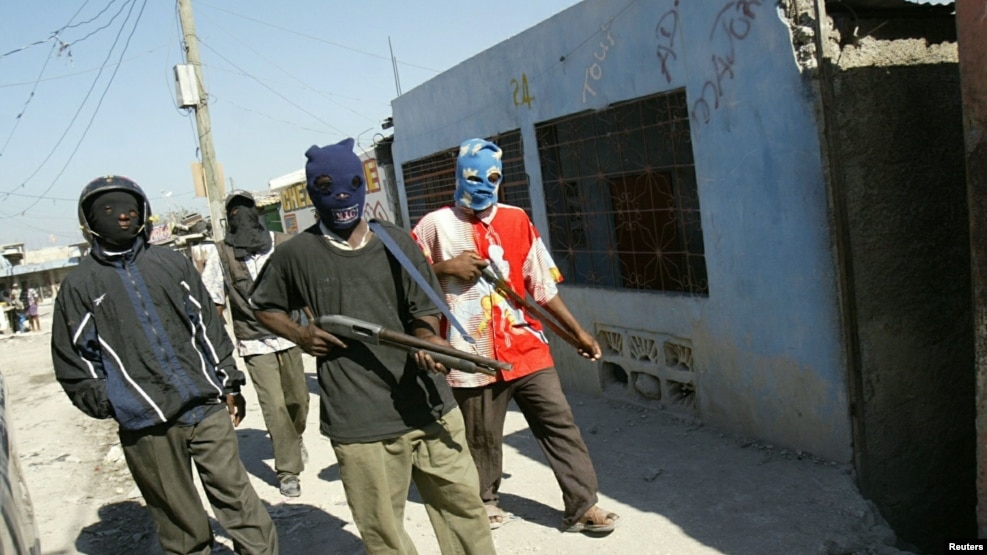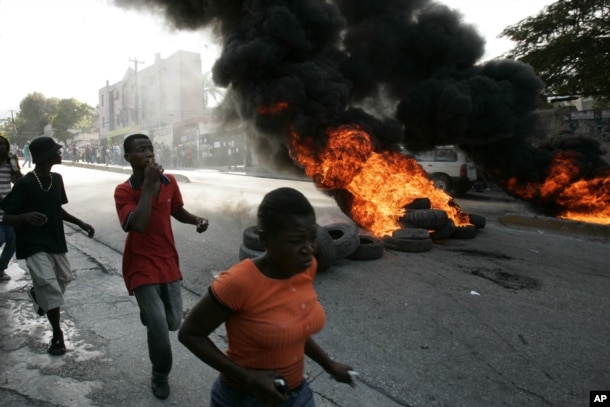
FILE – Haitian vigilante gunmen patrol their neighborhood in the Cite de Dieu (City of God) slum of Port-au-Prince, Haiti, Feb. 25, 2005.
The human rights section of the U.N. mission, known by its French acronym Minustah, said there has been only one conviction in a lynching case out of 483 incidents and 59 arrests reported between 2012 and 2015.
Frederic Gouin, coordinator of a legal analysis unit in the U.N. mission, told The Associated Press that researchers found that “inaction is merely a result of lack of will more than lack of resources or capacity.”
The report calls on Haiti’s justice ministry and judiciary to clearly instruct police, prosecutors and judges on their obligation to protect victims of lynching and take on cases instead of looking the other way.
“A lot could be achieved through very simple means,” Gouin said.
 FILE – Local residents run past burning tires outside the Delmas police station in Port-au-Prince, Dec 20, 2006. Riots erupted after residents surrounded the police station throwing stones and bottles demanding that the police hand over two suspected kidnappers to lynch them.
FILE – Local residents run past burning tires outside the Delmas police station in Port-au-Prince, Dec 20, 2006. Riots erupted after residents surrounded the police station throwing stones and bottles demanding that the police hand over two suspected kidnappers to lynch them.
The findings and various recommendations have been submitted to Haitian Prime Minister Enex Jean-Charles, but his office has not made any comment. Haitian National Police spokesman Garry Desrosiers told AP he could not speak about the report because he had not read it.
Vigilante attacks in Haiti have long been seen as a response over a dysfunctional justice system that all but ignores those living outside the crowded capital of Port-au-Prince.
But the new research suggests that lynching is mainly an urban phenomenon in Haiti. Some 70 percent of all reported lynching deaths between 2009 and 2015 occurred in the densely populated West department which includes Port-au-Prince.
Vigilante justice accounts for 11 percent of killings in Haiti, where homicide rates have long been far below the rates of many other countries in the hemisphere. Since 2009, there has been a slight increase in lynching deaths, with 7.5 per month in 2009 to 8.1 per month in 2015. There was a peak of 10 per month in the first half of 2014.
Nicole Phillips, a human rights lawyer with the Institute for Justice and Democracy in Haiti, said lynchings and other crimes will continue to go unsolved until the government prioritizes improvements to the justice system. She said pervasive corruption must be rooted out.
“Haitians must also understand how to enforce their legal and human rights within the justice system, rather than reverting to their own form of justice,” she said.
Citizens interviewed by the AP often appear indifferent to or approving of vigilante justice, arguing that the absence of a fair and efficient legal system gives people no choice but to take the law into their own hands.
The U.N. report says a precise breakdown of killing methods in 80 percent of the reported lynching cases remains unknown since that level of detail is missing in most police reports. But stoning, machete attacks and decapitations are reported by witnesses and AP journalists in Haiti who have gone to the scenes of numerous lynchings over the years.
The large majority of Haitian lynching victims are male theft suspects. Twenty-five percent of women targeted for vigilante violence are suspected of being witches, according to the U.N. report.
___________________________________________________